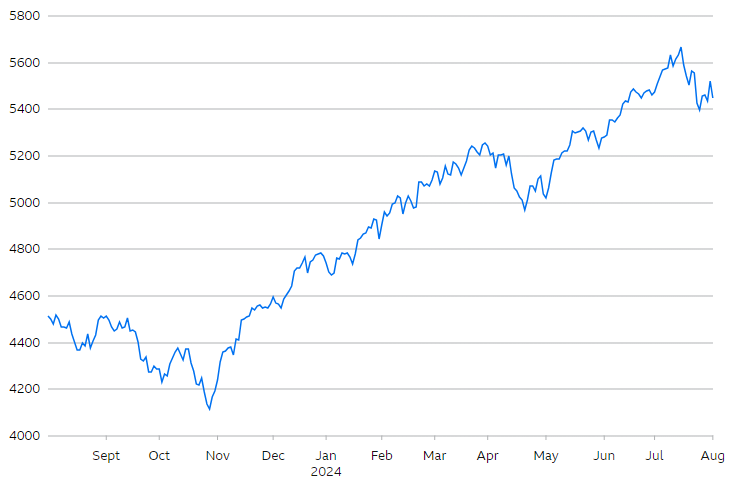
The S&P 500’s an index that tracks the performance of 500 of the largest public US companies. It’s considered to be a good measure of the health of the US stock market. As of the time of publication, the S&P 500’s 12-month performance is close to +21%.
 Source: BBC Market Data
Source: BBC Market Data
While the long-term picture has seen impressive growth, in the short-term there’s been some summer shivers. Some of the major factors impacting global economies and stock markets include:
- reports of ‘sticky’ inflation resulting in decade-high interest rates;
- geopolitical tensions in the Middle East fueling oil concerns; and
- doubt about the speed of Artificial Intelligence (AI) adoption in the technology sector.
Keep reading to find out how these factors have created short-term volatility and why diversification is crucial in pensions.
1. ‘Sticky’ inflation and decade-high interest rates
‘Sticky’ inflation is the combination of stubbornly high inflation, lower spending and low economic growth. In the US last year, the expectation was that the Central Bank in the US, the Federal Reserve, would cut interest rates at least three times throughout 2024. This all depended on the progress made in lowering the rate of inflation. In positive news, US inflation reached 3% in the 12 months to June 2024 - closing in on their 2% inflation target. But this isn’t fast enough for Chair of the Federal Reserve, Jerome Powell.
In the months since, expectations have been scaled back to a single interest rate cut later this year. This means that borrowing will continue to be challenging and interest payments will remain high for governments, businesses and consumers. Investors are concerned that interest rates have been too high for too long, creating the risk of a recession. The upcoming US presidential election, set to take place in November this year, adds to this uncertainty in the US economy, which in turn impacts what you’re seeing happen with your pension balance.
2. Tensions in the Middle East fueling oil concerns
Geopolitical tensions in the Middle East have been escalating over the last few months. These tensions have also contributed to market volatility, which in turn is impacting your pension balance. It’s worth noting that the Middle East is responsible for producing a significant portion of the world’s crude oil. Stability in the region is crucial for maintaining a stable global oil market.
In recent weeks oil prices had been trending downwards but after the news of the death of the political leader of Hamas, Ismail Haniyeh, oil prices surged. This triggered speculation about a war in the Middle East and rising inflation across the globe.
3. Scepticism about the speed of AI adoption
Finally, there are also growing concerns about some of the top-performing companies in the US stock market, often referred to as the ‘Magnificent Seven‘. The ‘Magnificent Seven’ comprises Apple, Microsoft, Amazon, Alphabet (Google’s parent company), Nvidia, Meta (Facebook’s parent company), and Tesla. Together, the ‘Magnificent Seven’ make up more than 29% of the S&P 500’s total valuation.
These companies have been very successful in the past year, with lots of excitement about a potential ‘AI gold rush‘. However, investor sentiment has shifted in recent weeks as it appears this new technology won’t revolutionise industries as fast or efficiently as originally speculated.
As such, the value of their share prices has gradually dropped in the past month, which you may have then seen the impact of in your pension balance. But how does this impact your pensions? If you look at the top 10 holdings in your pension, you may find that you’re invested in these companies.
Why pension diversification matters
Right now there’s uncertainty about whether the current volatility in the market is temporary or will continue for a while. The main reason behind this fluctuation seems to be inflation, which refers to the general increase in prices of goods and services over time. One thing to note is that different countries are experiencing varying economic situations. Some are doing well while others are facing challenges. Because of this, it’s crucial to consider diversification.
Most pensions are already diversified, across a range of locations and asset types. This means your retirement savings could be invested in company shares, bonds, cash, property and other assets, across the globe, depending on the plan you’ve chosen. As a result, a decline in one type of asset or location can be offset by growth in the others, with the aim of achieving not only balance, but ultimately growth over the long term.
If you want to understand more about how inflation could impact your pension savings and how far your savings could go in retirement, use our Inflation Calculator.
If you’re nearing retirement
It’s impossible to completely isolate your retirement savings from the wider economy - even investing in cash means you could lose real value due to inflation - but being invested in a pension plan that’s designed for those approaching retirement could reduce its risk of losing value.
For PensionBee customers nearing retirement, we have a couple of plans that are designed to lower your exposure to market volatility.
- 4Plus Plan - aims to achieve long-term growth of 4% per year above the cash rate, by managing your money actively across a range of investments.
- Preserve Plan - makes short-term investments into creditworthy companies. This reduces risk and preserves your money.
When markets are down many people are tempted to withdraw from their investments under the assumption their money is safer in their pockets than in stock markets. Or even move their pension to a different provider because they believe their current provider is to blame for the losses caused by market volatility.
Remember investments go up, as well as down. So the more you withdraw, the less you’ll have invested to recover when markets rise in value. Withdrawing during a downturn guarantees a loss, whereas waiting for markets to bounce back gives you an opportunity to regain and grow your investments again.
Have a question? Get in touch!
Again, it’s important to try not to fixate on short-term balance fluctuations. Short-term fluctuations are normal and expected, and even the portion of your pension that remains invested after you retire should continue to recover over the long-term.
You can check out our Plans page to learn how your money is invested in different assets and locations - or log in to your BeeHive to see your specific plan. You can always send comments and questions to our team via engagement@pensionbee.com.
Risk warning
As always with investments, your capital is at risk. The value of your investment can go down as well as up, and you may get back less than you invest. This information should not be regarded as financial advice.




